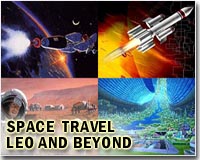 |
Paris (AFP) April 8, 2011 Viewed at the time through the narrow lens of Cold War rivalry, Yuri Gagarin's flight is now seen in a wider angle as forcing mankind to look beyond nationalism and at its own place in the cosmos. Launched into orbit aboard Vostok 1 on April 12 1961, the first man in space scored a massive propaganda victory for the Soviet Union in its battle with the United States. But Gagarin's 108-minute flight was to have a deeper and broader impact than as an exercise in political point-scoring. Until then, humans had only ever turned their gaze outwards, from the surface of their planet and into space. Now, for the first time, a man was looking down on the world. He could contemplate it beyond political boundaries, in all its fragility and isolation. As Gagarin himself said in elation: "I see Earth! It is so beautiful!" Cathleen Lewis, curator of international space programmes at the Smithsonian National Air and Space Museum in Washington, said the significance of Gagarin's flight had matured and broadened over time. "One of the unanticipated benefits of the Cold War is our understanding of the Earth as that very fragile planet in the middle of nowhere. It came out of that Cold War competition," she said in a phone interview. "Gagarin is seen these days much more as a global hero. "Everyone else who followed him, astronauts and cosmonauts alike, has had the same observation -- there is the planet Earth, you have that very thin layer of atmosphere around it, there are no political borders, it is one planet." Beaten by its rival, the United States sent up its first astronaut, Alan Shepard, in a sub-orbital flight on May 5 1961, although it was not until February 20 1962 that the first American, John Glenn, was to orbit the planet. On July 20 1969, Neil Armstrong set foot on the Moon, and the United States was the undisputed leader in space. Like Gagarin's trip, the Apollo 11 mission was at first feted as a national triumph. Later, it reinforced and amplified the same unconscious message. It showed the smallness of Earth, a precious haven of life in the emptiness of space -- an image so grand, and so terrifying, that political squabbles and nationalistic chest-beating seemed petty. Six years later, an Apollo spacecraft hooked up with a Soviet Soyuz for a nine-day teamup. International cooperation in manned flight was born. With the exception of China, a recent solo entrant, it has stayed that way, for the cost of putting humans into space, keeping them alive and getting them safely back to Earth is dizzyingly high. "If we go back to the Moon one day, we won't be sending seven different rockets for the seven international partners in the project -- everyone will be sharing," said Michel Tognini, a Frenchman who made three trips into space in the 1990s and now heads the European Astronaut Centre. European Space Agency (ESA) Director General Jean-Jacques Dordain said the 1960s were part of a learning curve of how humans could work together. "Between April 12 1961 and July 20 1969, space was a competition," he said at an exhibition in Paris to mark the Gagarin flight. "The advantage of a race is that it enables you to push ahead very quickly. But the sad thing is that in a race, you stop when you know who the winner is. "Cooperation is unfortunately much slower than a competition. It takes time to get cooperation going -- but the advantage is that it lasts."
Share This Article With Planet Earth
Related Links Space Tourism, Space Transport and Space Exploration News
 Russia seeks to regain Gagarin spirit in space
Russia seeks to regain Gagarin spirit in spaceMoscow (AFP) April 8, 2011 Fifty years after Yuri Gagarin's historic flight, Russia still prides itself on launching more satellites than anyone else and will soon have full responsibility for taking Americans into space. But although Russia will this year enjoy the delicious historical irony of providing the only means for launching US astronauts, its own modern space programme has been characterised by a lack of amb ... read more |
|
| The content herein, unless otherwise known to be public domain, are Copyright 1995-2010 - SpaceDaily. AFP and UPI Wire Stories are copyright Agence France-Presse and United Press International. ESA Portal Reports are copyright European Space Agency. All NASA sourced material is public domain. Additional copyrights may apply in whole or part to other bona fide parties. Advertising does not imply endorsement,agreement or approval of any opinions, statements or information provided by SpaceDaily on any Web page published or hosted by SpaceDaily. Privacy Statement |